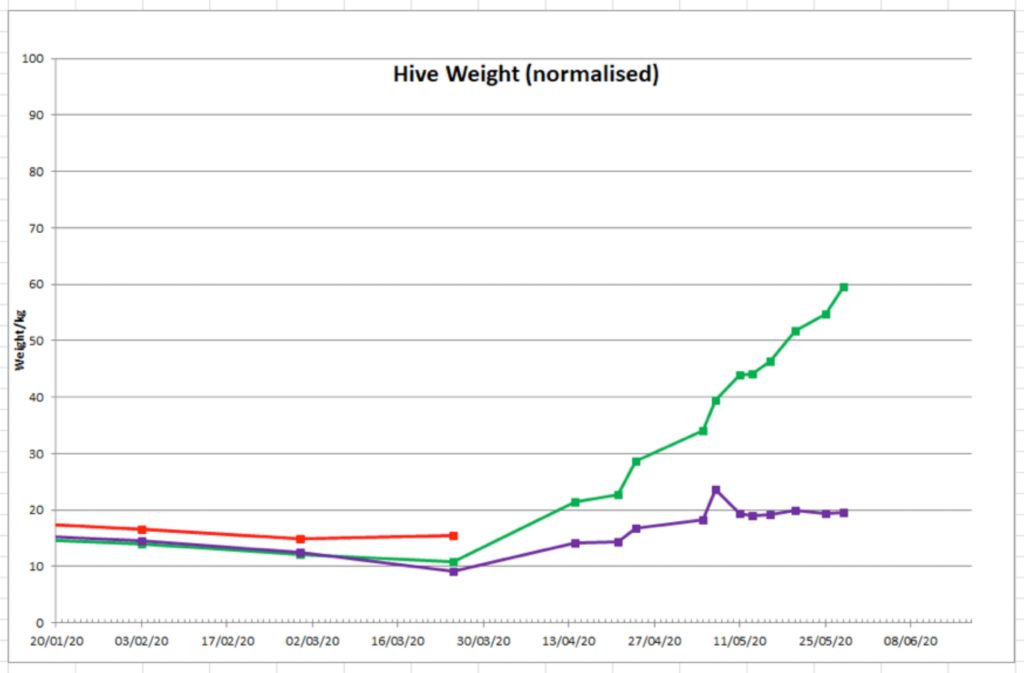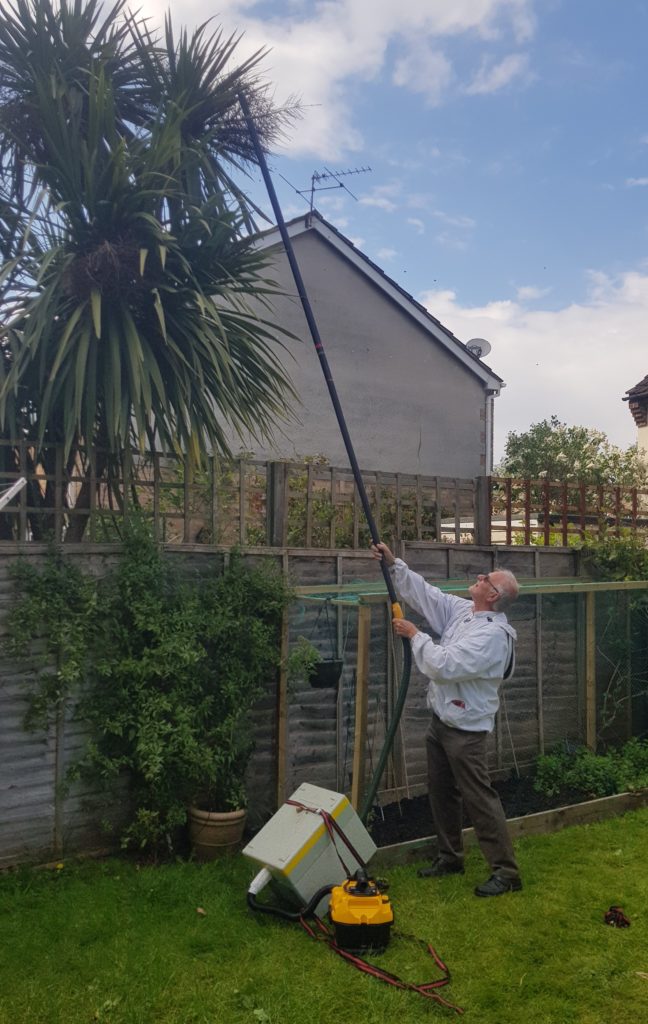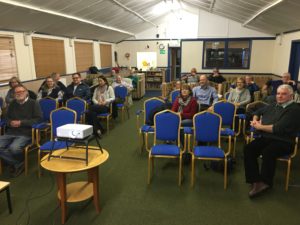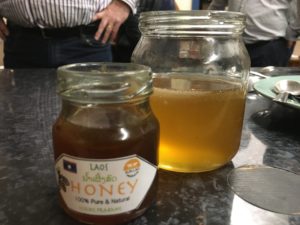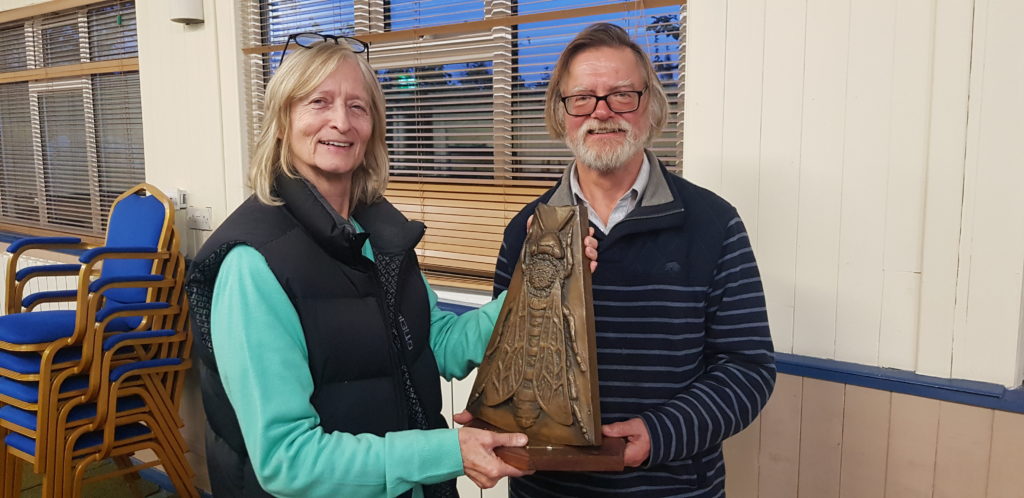Professor Stephen Martin – Life History and Current Research
Dr. Martin took us through the biology and the life cycle of the Asian hornet pointing out the differences
between social wasps and hornets. He explained the timings when new sexuals (males and new queens) are
produced and how young queens hibernate with the wings tucked under the body which is characteristic of
the hibernation state. When the hibernating queens emerge, they are particularly vulnerable as they need to
find food quickly to replenish the fat bodies used up through the hibernation period. The queen AH will not
go back to hibernation once she has ‘woken up’. This is also a vulnerable time for them because if the
weather goes cold again, many will perish.
Once a nest is established and there are workers that can take over feeding and nest building tasks, the queen
is more secure and the nest will rapidly expand, usually from July through to August & September. Asian
hornets often, but not always, build a larger secondary nest in mid summer. The latter is often built high up
in trees but may be at a low level. For a while both nests are occupied but eventually all the adult hornets
will transfer to the secondary nest, which by late summer will be very large and contain several thousand
hornets.
Dr Martin pointed out that AH has few natural enemies. There is a specialised parasitic wasp that flicks its eggs into the nest, a conopid fly that lays eggs in the cell, and a mermithid nematode that parasitizes the hornet’s gut. This has recently been found in France.
He pointed out that the queen, worker and male look very similar in size and colour so they are difficult to tell apart, although the queen has a larger fat body that fills the abdomen. Young queens leave the nest when they are ready – about two weeks after they emerge, when they have sufficient fat bodies. This is a sharp reminder that we need to find nests as soon as possible so that they can be destroyed before young queens mate and disperse, usually in October. Males are produced before young queens are raised.
Xesus Feas – 8 Year’s Experience Researching the Asian Hornet: Impacts and Future Needs.
Xesus gave a presentation based on his experience of studying the AH in Galicia, Spain. It increased from 4
nests in 2012 to 10,642 in four years, despite control measures being taken. It causes enormous damage to
forestry, beekeeping and fruit growers, including vineyards. Asian hornets cause damage to apples, pears,
plums and grapes by eating the ripe fruit. It is estimated that AH causes the loss of 4.5m euros per year to
fruit growers alone and so far about 65% of beehives have been lost in Galicia. Today, the main job of the
Galicia’s firefighters is to destroy AH nests.
An important point that he mentioned is that in his experience in Galicia, AH nests can be found anywhere
and everywhere, not just the expected places for primary or secondary nests. He gave many examples
including nests underground and finding nests in close proximity with each other, with an example of 5 nests
on the same building.
An interesting point that Xesus mentioned was that an old nest in winter still has larvae and pupae and even hibernating young queens have been found tucked up under the outer cover of the old nest.
Xesus spoke about the development of a lure of female pheromone which is designed to attract males, thereby disrupting and confusing the mating process. This has a degree of success. He also mentioned the development of a bee counter that can count the normal activity of bees leaving and returning to the hive that can then alert the beekeeper’s phone if the bees stop flying normally. This is an indicator that AHs are around the hive because bees tend not to go out as much.
Alistair Christie. The Jersey Experience in 2019
Alistair is the Coordinator for AH in Jersey and he spoke about how AH rapidly spread throughout the island. The primary nests are reported in spring mostly in or on buildings. He mentioned that often it is estate agents that call in and seem to be regular spotters.
In 2019 the first queen was seen on 31 March with more being recorded in April and May. The first primary nest was found on 12 April; the first secondary nest on 16 July. When the primary nest contains about 50 workers in mid summer, they will often start work on building the secondary nest, often not far away from the primary nest but usually at a higher elevation. Primary nests have a diameter of up to about 20cm – only worker hornets are produced in the primary nest. Secondary nests, where young queens and males are produced in September-October, grow much larger and are either spherical or have an elongate spindle shape. When the nest is made in a tree, AH appears to favour the east side of the tree.
Sometimes in winter and early spring hibernating queens are found. The first queen of 2020 has already been found, it was reported in January.
Alistair spoke about tracking hornets to their nests in Jersey which started in July in 2019. The groups of volunteers work together with the AHATS and beekeepers. They arrange themselves into teams;
- Verifiers- that confirm if a sighting is AH.
- Tracking Directors – who are experienced trackers and take on the case and organise everyone.
- Trappers – who look for nests, set and monitor traps to verify if a nest is close.
- Bait station managers, – who set up bait stations, mark hornets, note flight direction and return times which give an indication of proximity or distance of a nest from the bait station.
- Communicators – who keep everyone up to date. Alistair mentioned that they use Google ‘my maps’ app during the tracking operation and showed us some unusual locations where nests had been found. He mentioned safety awareness while tracking.
Alistair finished by saying that if beekeepers would like to volunteer and be involved in tracking AH in Jersey in 2020 (and have a holiday at the same time,) then contact him direct at asianhornet@gov.je and he will help arrange it.
Peter Kennedy. Research in 2020.
Peter spoke about Atlantic POSitive, an EU-funded initiative from the period of 2014 -2020 between a number of partners including University of Exeter in the UK, University College Cork in Ireland and eight other partners on the Atlantic side of Spain, Portugal, France and the British Isles. The partners aim to find collaborative ways for the ‘Conservation of Atlantic pollination services and control of the invasive species Vespa velutina’.
This will cover; Environmentally responsible control measures; Apiary management techniques; The study
of pollinator communities and Radio telemetry techniques and includes –
- Nest locations are being mapped to build up information on the nesting preferences of AH.
- Investigation of traps and baits
- Looking for differences in bee defensive behaviour when confronted by AH
- Studying which flowers are visited by AH
- Looking for possible biocontrol agents
- Use of radio telemetry to track hornets back to their nests
- Education of beekeepers and the general public
- The cost/benefit of control measures
- Acoustic warnings of AH activity at hives
- The impact of AH on honeybees and bumblebees
- Analysis of faeces produced by worker AH and larvae gut contents to see what insects they have been feeding on
- The impact of AH on pollinating insects when they are visiting flowers NBU update on Asian hornet Belinda Philipson from Defra policy was there together with Sandra Gray, from the National Bee Unit, who was standing in for Nigel Semmence.
Sandra gave us an update on AH with 17 UK confirmed sightings since 2016. She explained the overall situation from 2019 with three nests found and destroyed, two in Christchurch, Dorset. Both these nests were related, a primary and small secondary. The other nest was in Tamworth, in Staffordshire. Two single Asian hornets were also confirmed in 2019, a queen in New Milton, Hampshire in July and a worker near Ashford in Kent in the beginning of September. These were just single hornets found; monitoring traps set up in the areas where they were found recorded no others. Sandra mentioned that regarding the NBU working with AHATs, each Regional Inspector has the autonomy to work with the local AHATs as he/she sees fit if there is a confirmed sighting, to help in confirming a sighting, or with the follow-up surveillance after nest destruction.
Sandra went through the Outbreak Timeline which is as follows:
Confirmed sighting, by photo or sample.
o This triggers updates in the rolling communications and BeeBase news page.
o Emails are sent to beekeepers in a 10 km area asking them to be vigilant at their apiaries.
Local Regional Bee Inspector and Seasonal Bee Inspector respond.
o Visit site and investigate the back story – will decide on next steps.
o Local associations and AHATs are informed. Help asked for if needed.
o Town council contacted and informed
-
NBU set up bait stations as and where needed to identify direction and distance to the nest(s). If a
marked hornet returns to a bait station within a minute, the nest(s) is likely to be 100m or less away.
-
Forward Operation Base set up if needed.
o To co-ordinate trackers and tracking.
If/when nest is found, it is destroyed in the evening. (using an insecticide Facial D) o Nest removed the following morning
Surveillance of the area set up/continued by traps in case there are other undetected nests in the area o AHATs asked to assist in this.
NBU presence stands down only if clear of AH sightings one week after sighting/ nest destruction in the area.
Anne Rowberry (BBKA)
Anne spoke about the Short Certification On-line Qualification which will provide public liability insurance for AHATs (up to 15 named persons per Surrey division). This will give a similar level of cover to that which applies to beekeepers visiting other peoples’ gardens etc to collect bee swarms. It does not cover controlling AH nests, which must be left to professionals. The on-line qualification will be put on the BBKA website shortly. The way in which the multiple choice test questionnaire has been set up means that you cannot go on to the next question until you have given the correct answer to the current question. Note that some questions have more than one correct answer. When you have reached the end of the test, your details will be recorded by BBKA and you will be eligible for AH public liability insurance.
Surrey initiative
I would like to mention here that this was an initiative that Surrey BKA (through the Weybridge division) proposed to BBKA at the last ADM. So, good progress and well done Weybridge.
I hope the actual questionnaire that will emerge from BBKA will be of appropriate quality for the NBU to take seriously. It should be of a high enough level to allow the NBU to have the confidence to work more closely with the AHAT members that have the certificate. My concern is that it will be too simple and of little training value to anyone.
An online AH questionnaire is already up and running on the new www.ahat.org.uk website which, although still evolving, is already pretty good and worth a visit to test your preparedness. It is being developed by Victor Willmington and the Devon team and is designed on distance learning principles which encourages some research to find the correct answers.
According to the literature and the experience in France, Asian Hornets will begin to emerge from winter hibernation when the temperature is consistently above 13°.
In the UK, this should be late in March to the beginning of April.
On the Island of Jersey, a single hornet has already been found in the beginning of January. It is thought to have been disturbed from hibernation. Last year, 2019 the first queen was found on the 6th February.
It goes without saying that we need to be vigilant and really learn as much as we can about this dangerous insect. I am not listing here how to be vigilant, where to look or what to do for this month, we are all capable of finding this out for ourselves. A good place to start is
https://www.ahat.org.uk/and also https://www.gov.uk/government/news/asian- hornet-uk-sightings-in-2018
We need more volunteers to join the action teams. Please consider putting yourself forward if you are able,
capable and have some time to be available if and when needed. Of course, we all have other commitments
and other obligations but the more people that are on the team list, the easier it is to find someone available
when needed.
Jonathan Brookhouse (Guildford Division)14th Feb. 2020 With some additions by Andrew Halstead

